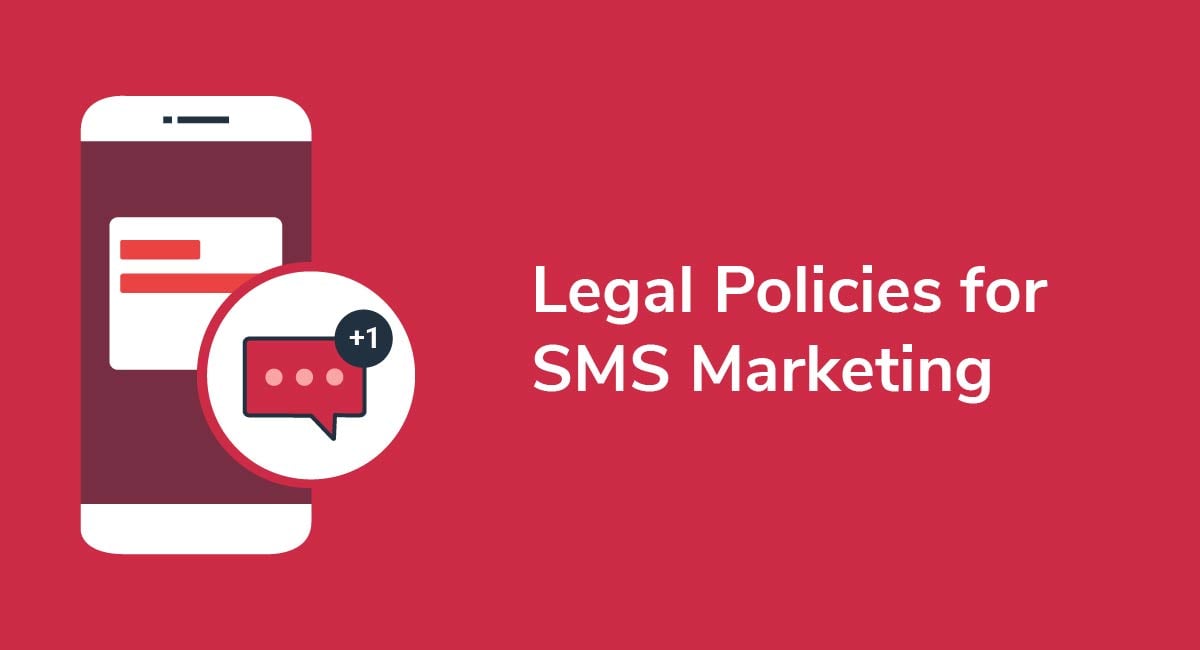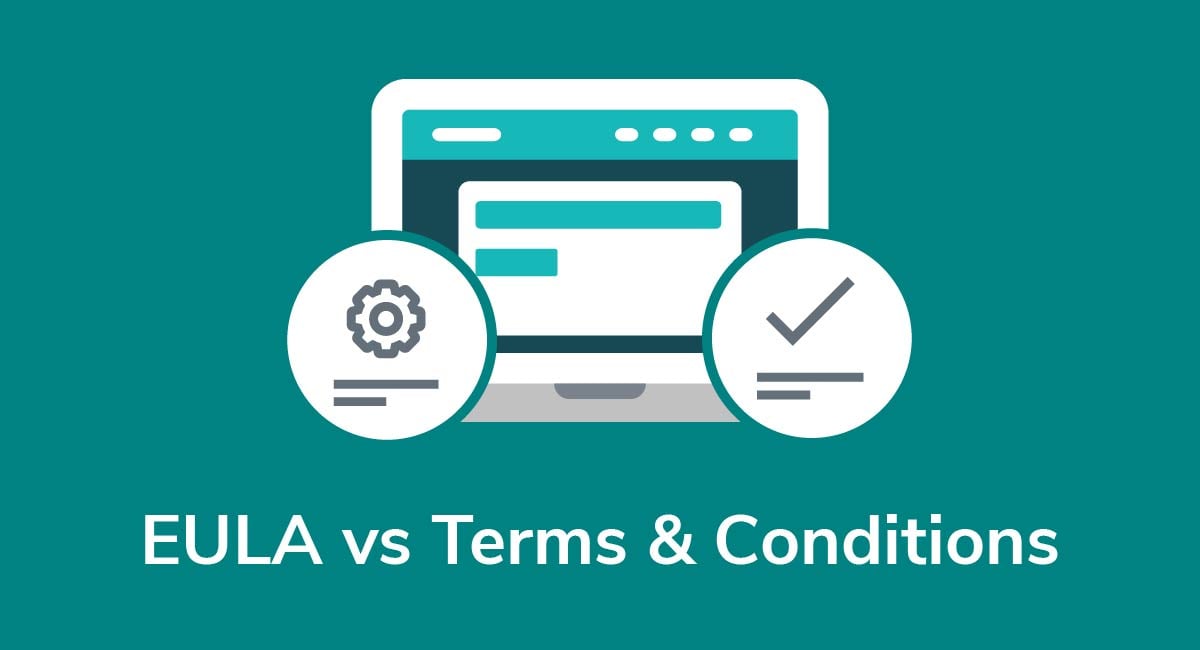Does Copying a Terms and Conditions Agreement Violate Copyright?
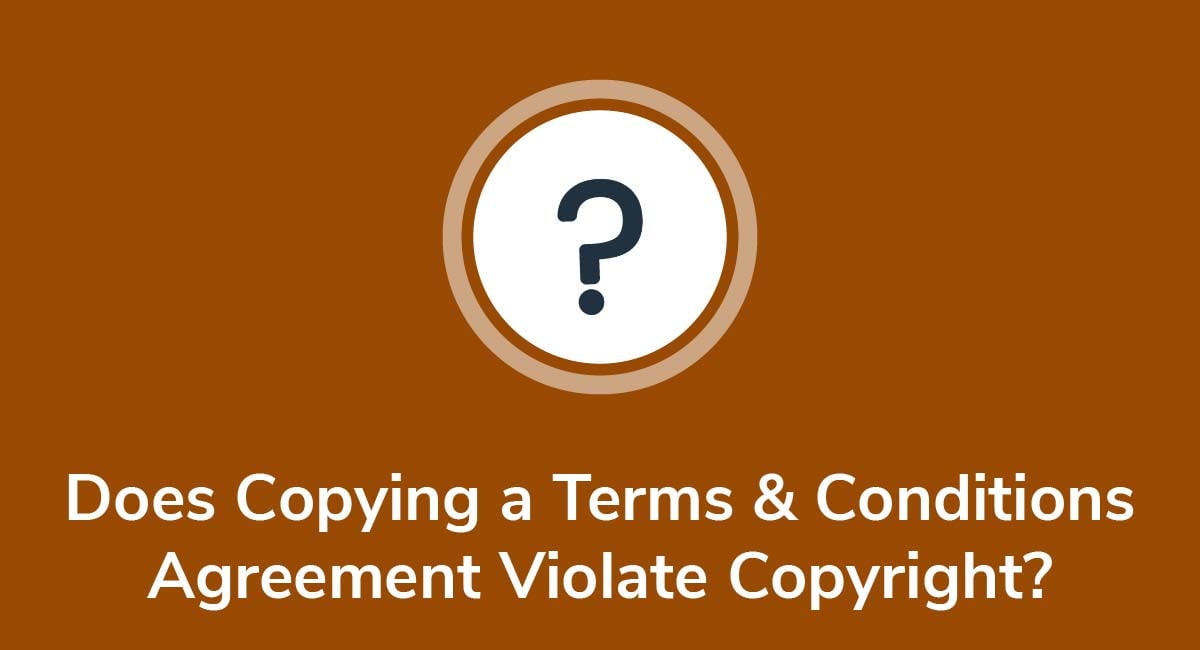
If you have a business or website, it's a good idea to have a Terms and Conditions agreement outlining the terms which visitors must agree to before they use your services.
Since there are so many Terms and Conditions agreements in use already and available online, it might be tempting to simply copy another company's. However, this is not advisable. Not only could this be a copyright violation, but it could damage your business in various other ways.
There are many reasons why every business should have its own Terms and Conditions. Below, we will explain how Terms and Conditions work, why copying an agreement could be considered a copyright violation, and how to create your own Terms and Conditions agreement.
Need Terms and Conditions for your business? We can help you generate a customized Terms and Conditions agreement in around two-three minutes for free. Try our Terms and Conditions Generator and just follow these steps:
- Click on the "Create your Terms and Conditions today" button.
- At Step 1, select the where will you use your Terms & Conditions and click "Next step":
- Add information about your business:
- Select the country and continue to the "Next step":
- Answer the questions about your business practices and click "Next step" when finished:
-
Enter your email address where you'd like your agreement sent and click "Generate."

You're done! Now you'll be able to instantly access and download your new agreement.
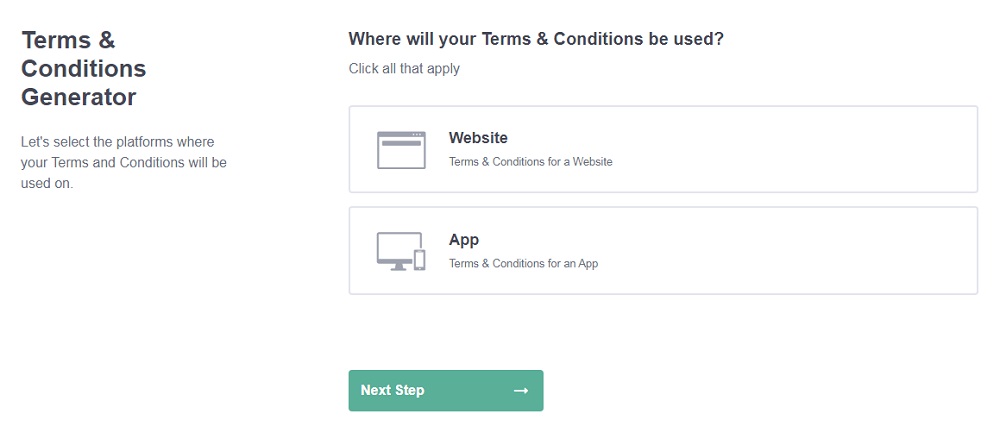
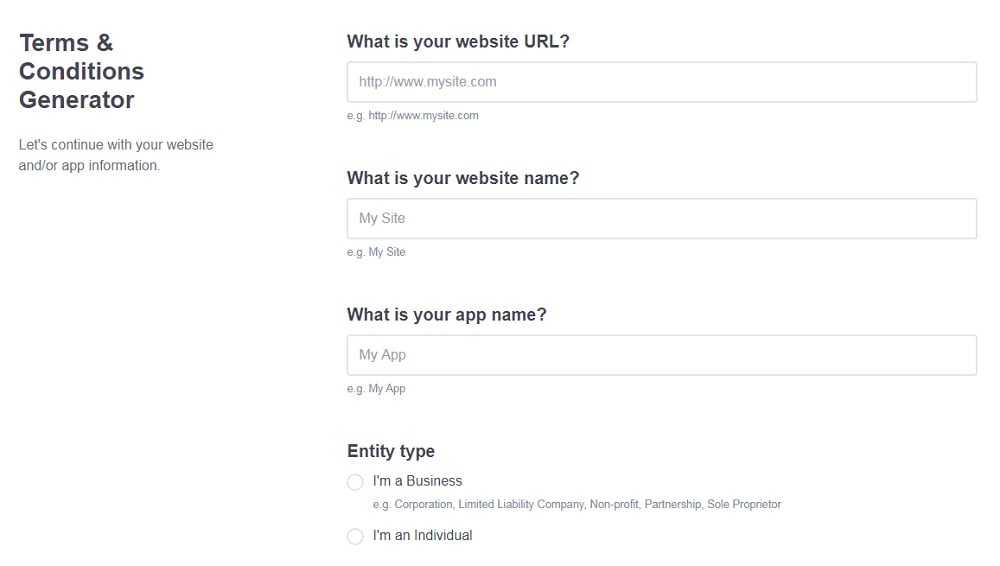
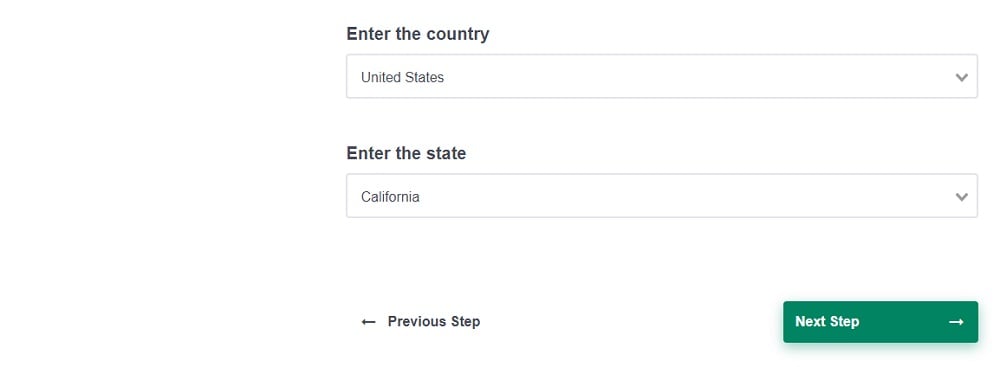
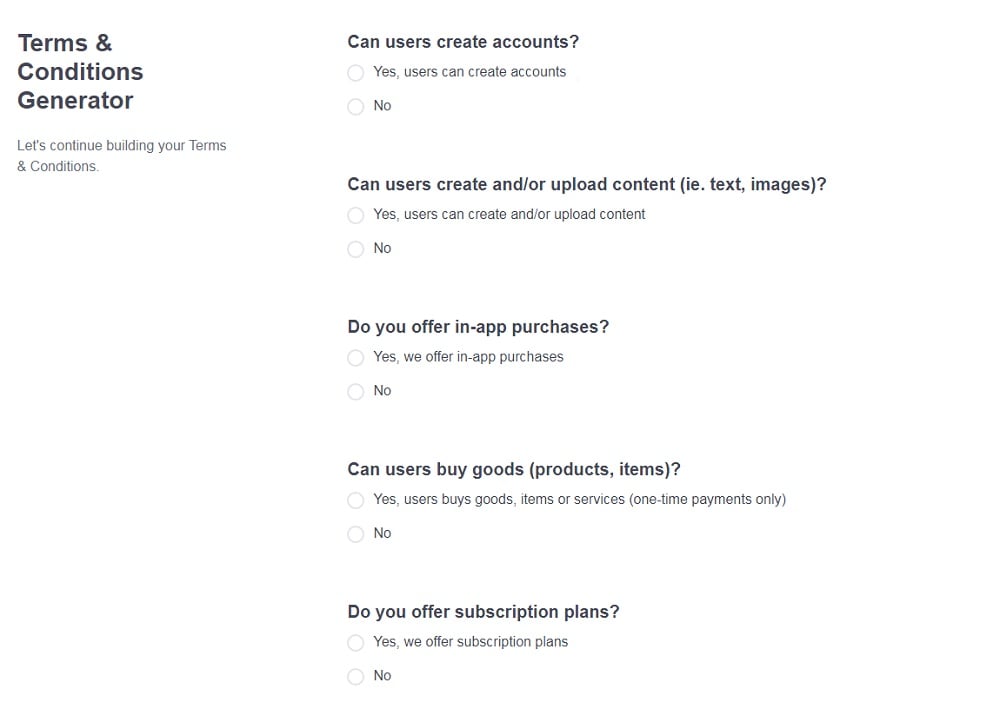
- 1. What is a Terms and Conditions Agreement?
- 2. Are Terms and Conditions Agreements Legally Required?
- 3. Who Needs Terms and Conditions Agreements?
- 4. Benefits of Having a Terms and Conditions Agreement
- 5. Can You Copy a Terms and Conditions Agreement?
- 6. Terms and Conditions Agreements and Copyright Laws
- 6.1. Asserting Copyright
- 6.2. Fair Use
- 7. 5 More Reasons Why You Should Not Copy a Terms and Conditions Agreement
- 7.1. 1. Lack of Specificity
- 7.2. 2. Irrelevancy
- 7.3. 3. Insufficient Legal and Liability Protection
- 7.4. 4. Legal Inaccuracies
- 7.5. 5. Increased Risk of Lawsuits
- 8. How to Create a Unique Terms and Conditions Agreement
- 8.1. Use a Terms and Conditions Generator
- 8.2. Use a Terms and Conditions Template
- 8.3. Use Existing Terms and Conditions Agreements Only for Reference
- 9. Summary
What is a Terms and Conditions Agreement?
A Terms and Conditions agreement constitutes a type of contract. It forms the basis of a legal agreement between a business and its website visitors or customers.
By using your website or buying your goods and services, the end user agrees to follow your Terms and Conditions. You agree to provide certain goods and services in exchange for the end user's cooperation with the agreement.
Since a Terms and Conditions agreement forms a contract between you and other parties, the agreement should be easily accessible from your website. For example, Atlassian links to its Terms agreement in its website footer:

Terms and Conditions may be known by various other names, such as "Terms of Use" and "Terms of Service." As we can see, Atlassian refers to its Terms and Conditions simply as "Terms" in its footer link.
Are Terms and Conditions Agreements Legally Required?

There is no legal requirement to have Terms and Conditions. However, there are a number of reasons why you should have one. Most customers and end users expect to see Terms and Conditions on a website, and so it's advisable to include one even if it's only just a few clauses long.
Since they're not legally required, there's no set format for drafting Terms and Conditions, but they should cover essentials such as:
- Account termination
- Copyright and intellectual property (IP)
- Dispute resolution
- Governing laws (jurisdiction)
- Limitation of liability and warranty information
- Disclaimers
You can also include clauses covering matters such as payments, free trials, shipping, and returns, depending on your business.
Who Needs Terms and Conditions Agreements?

Since Terms and Conditions agreements aren't legally required, no business must have them. However, you should have Terms and Conditions if you offer goods or services for individuals to buy or use.
Here are some examples of businesses that could benefit greatly from having Terms and Conditions:
- Gaming and gambling websites
- Online retailers and ecommerce stores
- SaaS apps
- Small business owners
- Social media platforms
- Sole traders e.g. plumbers, electricians, tradesmen
If in doubt, it's best to have Terms and Conditions agreement instead of copying it from other websites.
Benefits of Having a Terms and Conditions Agreement

There are many benefits to having Terms and Conditions on your website:
- It's much easier to resolve disputes if you can point to the provisions of your Terms and Conditions to determine what happens next.
- You can use Terms and Conditions to limit your liability which reduces your exposure to costly lawsuits.
- Terms and Conditions can help you assert your IP rights which makes it easier to sue users who infringe your copyright.
- With Terms and Conditions, you can set rules for user behavior and terminate or cancel accounts which break your rules.
- If you bill users e.g. you have a subscription service, Terms and Conditions make it easier to chase overdue payments or suspend accounts.
- Since most users expect businesses to have Terms and Conditions, including them on your website makes your business look more professional.
Can You Copy a Terms and Conditions Agreement?

Technically, you can copy Terms and Conditions. But you shouldn't, and we'll explain why.
If you read enough Terms and Conditions, you'll see that they contain very similar clauses and wording, and they cover generally the same areas. This may lead you to believe that they're all the exact same and that it's fine to copy someone else's agreement.
It's also, from a technical perspective, simple enough to copy and paste another company's Terms and Conditions, change the business name and contact details, and use them as your own.
However, not only can copying Terms and Conditions be illegal, it may do your business more harm than good.
Let's consider the reasons why copying Terms and Conditions may be considered a copyright violation and the more general reasons why copying Terms and Conditions is ill advised.
Terms and Conditions Agreements and Copyright Laws

Copyright laws protect written content from the moment of creation. In other words, whenever you write something, including a legal document, it benefits from copyright protection. This means that if someone else copies the work without permission, it might be considered a copyright violation.
As an example, say you're an online jewelry retailer. You find a Terms and Conditions agreement from another online jewelry retailer which fits your needs perfectly. You copy the document in its entirety and only change the business name, contact details, and business address. This could be considered a copyright infringement and the other retailer may compel you to take your document down.
Asserting Copyright
There's no need to formally assert copyright since it comes into force at the moment of content creation. However, most businesses do assert copyright for one simple reason: many customers won't understand copyright law. Some individuals might think that unless there's a copyright notice or clause addressing it in a legal agreement, the work is unprotected.
For example, Atlassian uses the standard copyright notice:

And DeviantArt has a copyright clause in its Terms of Service:

The main point is this: even if there's no copyright symbol or clause in the company's Terms and Conditions, assume the agreement is protected by copyright. Taking any text or content from a website without permission can be an IP violation unless an exception applies.
Fair Use
There's an exception to the rule, known as fair use. Fair use allows you to use certain copyrighted materials without permission.
To rely on fair use, two criteria must be met:
- You're not holding yourself out as the original author of the work, and
- You use the content in a transformative way e.g. you make significant changes to the language or you're using it for a completely different purpose
Typically this allows you to use content for, as an example, educational purposes. As a general rule, though, it's simply best to create your own Terms and Conditions to avoid legal allegations.
5 More Reasons Why You Should Not Copy a Terms and Conditions Agreement

In addition to possibly getting in legal trouble for violating copyright laws, here are five other downsides to copying a Terms and Conditions agreement rather than drafting your own.
1. Lack of Specificity
Copying a Terms and Conditions agreement might mean you leave key clauses out. For example, depending on your business, you might need age-restriction clauses or clauses about website functionality, such as payment terms and subscription services.
If you simply copy someone else's Terms and Conditions, there's a chance your agreement won't be specific enough to suitably protect your business. So, not only could you be sued for copyright infringement, but you could be challenged for another matter such as failing to protect minors using your website.
2. Irrelevancy
Irrelevant clauses might confuse your customers or make your business seem unprofessional. For example, if you copy a lawyer's Terms and Conditions but you're a retailer, the clauses won't be relevant to your business.
For example, an online app store doesn't need a clause about legal advice, like this one from Latham & Watkins LLP:

3. Insufficient Legal and Liability Protection
No matter what sector you're in, you need to address certain issues in your Terms and Conditions agreement. For example, doctors need disclaimers that information is not medical advice, web app stores will have strict licensing and limitation of liability clauses, and retailers will have shipping and returns clauses.
If you copy Terms and Conditions, your document might not give you the protection you need. You might not meet your industry's compliance requirements or legal standards.
As an example, WebMD has a clear medical disclaimer in its Terms and Conditions:
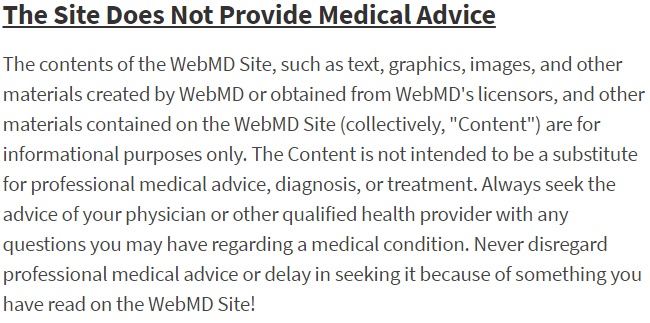
If you're a medical website and you don't have something similar, you risk exposing yourself to legal and liability issues.
4. Legal Inaccuracies
If you copy Terms and Conditions without reading them through, you risk copying legal inaccuracies. For example, if you're copying older Terms and Conditions that haven't been updated in a while, they might not reflect changes in, say, commercial law or liability law. Or they could simply be poorly drafted Terms and Conditions with unfair, misleading, or inaccurate clauses which will be unenforceable.
Copying inaccurate or outdated clauses is a very real risk associated with using someone else's Terms and Conditions, even if you're taking them from a reputable or highly regarded website.
5. Increased Risk of Lawsuits
Put simply, whenever there's unclear, inconsistent, or poorly drafted Terms and Conditions, you're increasing your risk of a lawsuit. There's a chance that courts might rule in favor of the customer if your Terms and Conditions are deemed prejudicial in some way, which could be costly to your business.
Furthermore, if you copy Terms and Conditions without permission, your risk of being sued only increases. And even if you don't face a lawsuit, your reputation could be damaged.
Check out our feature article to find out about more common issues with Terms and Conditions agreements and how to avoid them: 8 Common Issues with Terms and Conditions Agreements
How to Create a Unique Terms and Conditions Agreement

Terms and Conditions agreements can seem daunting if you've never drafted them before. However, there are three ways to make the process easier without copying someone else's Terms and Conditions.
Use a Terms and Conditions Generator
Terms and Conditions generators automatically create bespoke, full agreements for you to use. They're built specifically for your business, they only take a few minutes to create, and you can change the document as your needs evolve or your business practices change.
Use a Terms and Conditions Template
Terms and Conditions templates don't automatically generate entire agreements for you. However, they are structured and they give you an outline, or template, to follow. You can add your own business details and tailor the agreement to suit your needs with the confidence that you're including the right clauses to protect your company.
Use Existing Terms and Conditions Agreements Only for Reference
Although directly copying and pasting a whole Terms and Conditions Agreement could be a copyright violation, there's no reason you can't use existing Terms and Conditions as guidance for writing your own clauses. You can use someone else's agreement to:
- Understand the type of clauses you might need
- Look at what language to use
- Determine how to structure your agreement
As an example, if you're unsure how to word a clause about third-party advertisements on your website, you might look at this clause from FreshBooks:

You might change features such as the language, style, and tone. Or, you might change the order of the clause or what you emphasize. However you use examples, just ensure you're not copying the clauses directly and do not use identical wording or phrasing.
In some ways, it's inevitable that Terms and Conditions agreements from many different businesses may end up looking or reading similarly, especially if they're for similar businesses. However, every business is unique and this must be reflected in your own agreement.
For more detailed step by step guidance on creating a Terms and Conditions agreement, check out our feature article: How to Write a Terms and COnditions Agreement
Summary
Terms and Conditions agreements, although not legally required, form the basis of a contract between a business and its users and are exceptionally important to have.
It's technically possible to copy Terms and Conditions because they are often very similar from one business to the next.
However, there are six reasons why you should never just copy another company's Terms and Conditions:
- You may be sued for copyright infringement
- The clauses won't be specific enough to cover your needs
- Some clauses may be irrelevant and confusing
- The clauses might not offer you enough legal clarity or protection
- Legal inaccuracies could render your Terms and Conditions unfair or legally meaningless
- No contract increases the risk of lawsuits
Draft your own legal agreements using a template or generator, and use existing clauses for reference only.
